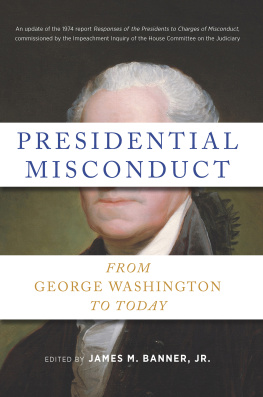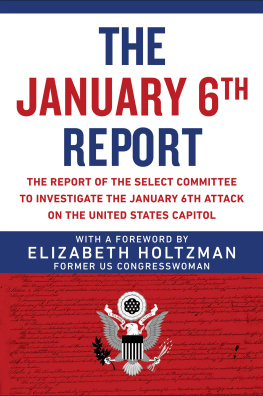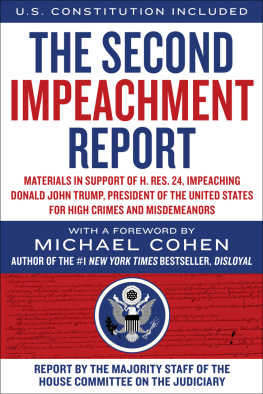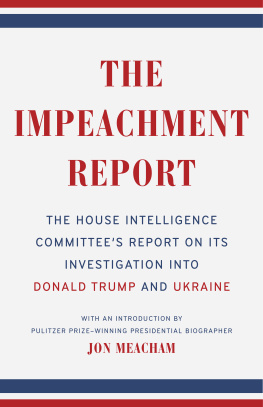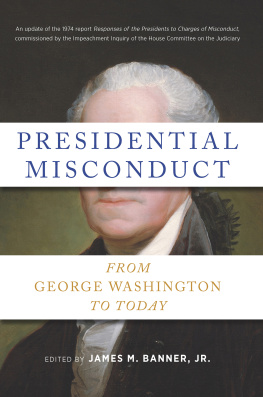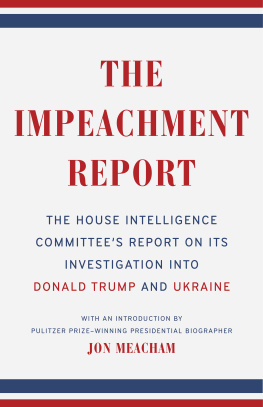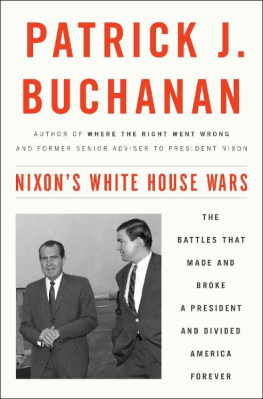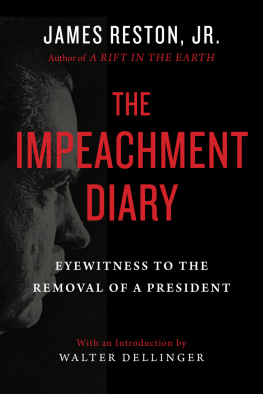
PRESIDENTIAL MISCONDUCT
PRESIDENTIAL MISCONDUCT
FROM GEORGE WASHINGTON TO TODAY
EDITED BY
JAMES M. BANNER, JR.
CONTENTS
James M. Banner, Jr.
C. Vann Woodward
Lance Banning
Lance Banning
James M. Banner, Jr.
James M. Banner, Jr.
James M. Banner, Jr.
Richard E. Ellis
Richard E. Ellis
Richard E. Ellis
Michael F. Holt
Michael F. Holt
Michael F. Holt
Michael F. Holt
Michael F. Holt
Michael F. Holt
Stephen B. Oates
William S. McFeely
William S. McFeely
John G. Sproat
John G. Sproat
John G. Sproat
R. Hal Williams
R. Hal Williams
R. Hal Williams
John G. Sproat
John W. Chambers
John W. Chambers
John W. Chambers
Robert P. Ingalls
Robert P. Ingalls
Robert P. Ingalls
James Boylan
James Boylan
Mark I. Gelfand
Mark I. Gelfand
Mark I. Gelfand
Kathryn S. Olmsted and Eric Rauchway
Joan Hoff
Kevin M. Kruse
Jeremi Suri
Kathryn S. Olmsted and Eric Rauchway
Kathryn Cramer Brownell
Kathryn S. Olmsted and Eric Rauchway
Allan J. Lichtman
A MEASURE OF EXECUTIVE MISDEEDS
James M. Banner, Jr.
L ike the report and book that preceded it in 1974, this book is occasioned by a grave crisis in the nations affairs.
In 1974, President Richard M. Nixon was facing impeachment by the House of Representatives for acts brought to light during the Watergate crisis. Those events led the House Committee on the Judiciary, as part of its investigation into the grounds for the Presidents impeachment, to seek the production of a historical account of presidential misconduct reaching back to the administration of George Washington. In 2019, another president and his associates and subordinate officers are under scrutiny for a wide range of possible legal and constitutional offenses: collusion with a foreign power to affect the outcome of his election, financial ties with foreign interests that interfere with his ability to act in the national interest, obstruction of justice, suppression of evidence, disregard of campaign finance laws, money laundering, tax evasion, breaches of the emoluments clause of the Constitution, and other offenses, such as abusing power, directing the commission of felonies, and undermining the rule of law and norms of democratic governance. Already, some of the Presidents close associates have pled guilty to perjury, violation of campaign finance laws, and other crimes. Since the parallel gravity of the two crises is apparent, an expanded historical survey of presidential misconduct since 1789, one updated to cover the eight presidential administrations since 1974, including Nixons, is clearly needed. It must of course be borne in mind that, as of the early days of 2019, the present crisis remains unresolved. But we can at least say that todays crisis poses enough threats to constitutional government and normal political practices to demand comparison with previous instances of known presidential misconduct. This book renews efforts by historians to provide the basis for that comparison.
The 1974 report to the Impeachment Inquiry took shape with the same urgency as this one. In April of that year, during hearings on potential articles of impeachment against President Nixon, John Doar, Special Counsel to the Impeachment Inquiry, asked C. Vann Woodward, a Yale historian, to direct a study of presidential misconduct from the administration of George Washington through that of Nixons predecessor, Lyndon B. Johnson. A historical frame of reference, Doar believed, would help members of the Judiciary Committee judge the gravity of accusations against Nixon and senior administration officials. Woodward recruited three other historiansWilliam E. Leuchtenburg, William S. McFeely, and Merrill D. Petersonto help manage the production of the report. Under their direction, eleven other historians, among whom I was one, placed on record how earlier presidents had responded to charges of misconduct against themselves, senior members of their administrations, and employees of the federal bureaucracy. Within an eight-week deadline, we managed to prepare our respective segments of the report.
Participants in the study understood from the start that the study might be published as part of the official record of the Inquiry. But since the President resigned in August 1974 only weeks after we submitted our report in late June, our work was not included in the investigations formal record. What use, if any, the committee and its staff members made of the study was never made clear to us. Subsequently, the report fell into the public domain and was published the same year by Delacorte Press as a book bearing the title of the original report: Responses of the Presidents to Charges of Misconduct. For that book, Woodward added an introduction, The Conscience of the White House, which is included here. With Nixon out of office, few took notice of the book; even today, most historians are unaware of its existence.
Those of us who participated in the original study were confident that, consistent with the intent behind Doars invitation, the report contributed to knowledge about a largely neglected aspect of the nations political and constitutional historythat is, presidential misconduct. We also thought that, if it were needed, a continued study would provide Americans with a means of assessing the performance of later White House occupants. This extension of the original work offers the grounds for that assessment.
As Woodward stated in 1974, our study of presidential misconduct was without precedent. It seemed, to both the Impeachment Inquiry and our group of historians, that the political and constitutional circumstances of the time had no parallel in American history. The study was also unprecedented in that no other general survey of the subject then existed. That, to our knowledge, remains the case, although discrete studies of particular scandals continue to appear. Like its predecessor, this expanded study is distinctive in its content and similarly urgent in the need that makes it relevant. But its value must also be measured by its utility in providing grounds for assessing the conduct of each presidential administration. Under normal circumstances, historians, journalists, and others involved in law and politics might constitute the limited audience for such an assessment. But these extraordinary times require another effort to provide a wider audience with a rough kind of metric by which the current crisis can be broadly understood. Like the original report, this one ends with the most recently completed administration, that of Barack Obama.
The book is unusual, as well as unprecedented, because, unlike most historical works, its core contentsa series of brief essays, organized chronologically by administration, of charges and findings of misconduct faced by successive presidenciesdeliberately lack interpretation. The essays are episodic and almost without exception self-contained; even Woodwards original introduction is spare in its interpretive suggestions. Moreover, the historians who have prepared the materials added to those written in 1974 have, like the original authors, undertaken no new research; as in 1974, the new authors have grounded their work in what is already known from existing secondary sources and published public documents. While all chapters reflect a normal alertness to relevance and context, they are not meant to be exploratory or argumentative. Any breaches in these guidelines are inadvertent.
Next page
